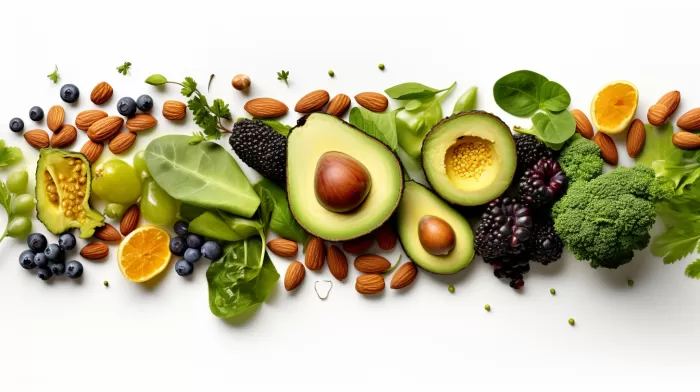Imagine lowering your risk of liver cancer just by increasing your intake of one essential nutrient. It’s possible with vitamin E. This potent antioxidant not only supports the health of your nervous system, protects your digestive tract, and guards your cell membranes, but research shows it may also help protect against liver cancer.
For a disease that’s the third most common cause of cancer mortality in the world, fifth most common in men, and the seventh most common in women, this is vital information you need to know.
Two studies conducted by the Shanghai Cancer Institute and Vanderbilt University were published in the Journal of the National Cancer Institute, indicating that a higher intake of vitamin E can lower liver cancer risk. The researchers compared liver cancer risk among participants with high intake of vitamin E to those with low intake. The results were clear: “High intake of vitamin E from either diet or supplements was related to lower risk of liver cancer in middle-aged or older people,” says researcher Xiao Ou Shu, M.D., Ph.D., professor of medicine at the Vanderbilt Epidemiology Center.
Considering that most Americans are deficient in vitamin E, it’s essential to know how to increase your intake and reduce the risk of liver cancer effectively. Dietary sources of vitamin E include nuts (especially almonds), vegetable oils (like sunflower or safflower oil), avocados, green olives, and leafy green and orange vegetables.
But not all sources of vitamin E are created equal. Let’s dive into the types of vitamin E and which are the most beneficial in protecting against liver cancer.
Natural vs. Synthetic Vitamin E
Vitamin E is a family of eight different compounds, each with its own benefits. Four of these compounds are called tocopherols (alpha, beta, gamma, and delta), and four are called tocotrienols (also alpha, beta, gamma, and delta).
Most supplements on the market contain only synthetic alpha-tocopherol, often labeled as “vitamin E” or “dl-alpha-tocopherol.” While alpha-tocopherol is the most well-known and abundant form of vitamin E in the body, research indicates that it’s not the most effective at preventing liver cancer.
According to a study published in the Journal of Nutrition, gamma-tocopherol and delta-tocopherol appear to be more potent anti-cancer agents than alpha-tocopherol. These findings suggest that if you want to protect your liver health, natural mixed tocopherols and tocotrienols are the way to go.
So how can you ensure that you’re getting enough gamma and delta-tocopherol, the critical cancer-fighting forms of vitamin E?
Foods Rich in Gamma and Delta-Tocopherol
To obtain more gamma and delta-tocopherol, look for foods rich in these forms of vitamin E. Some of the best sources include:
- Seeds: Sunflower seeds, sesame seeds, pumpkin seeds, and flax seeds are all excellent sources of gamma-tocopherol.
- Nuts: Pecans, walnuts, and pistachios contain gamma-tocopherol.
- Soybean oil: While not the healthiest oil due to its high omega-6 content, soybean oil is an abundant source of gamma-tocopherol.
- Vegetables: Leafy greens, tomatoes, and bell peppers provide small amounts of gamma-tocopherol.
It is important to note that delta-tocopherol is a bit more challenging to find in dietary sources. Foods containing small amounts of delta-tocopherol include pumpkin seeds and some vegetable oils. If you want to ensure an adequate intake of delta-tocopherol, consider a supplement containing mixed tocopherols and tocotrienols.
How Much Vitamin E Do You Need?
To get the most benefits from this powerful antioxidant, it’s essential to know the recommended daily intake of vitamin E.
For adults, the recommended daily allowance (RDA) for vitamin E is 15 mg or about 22.4 international units (IU) of natural alpha-tocopherol equivalents. It’s crucial to mention that most Americans don’t meet the RDA for vitamin E, putting them at higher risk for a deficiency and potentially increasing their risk of liver cancer.
It’s essential to work with your healthcare provider to determine the optimal amount of vitamin E for your specific health needs, especially if you want to use vitamin E supplementation as a preventive measure against liver cancer.
Important Considerations
As with any supplement or health intervention, it’s crucial to consult your healthcare provider before incorporating significant dietary changes or beginning a supplement regimen. Specifically, in the case of vitamin E, some groups may want to exercise caution:
- People with blood clotting disorders: Vitamin E has blood-thinning effects, so those with blood clotting disorders or taking anticoagulant medications should consult their healthcare provider before using vitamin E supplements.
- Pregnant or breastfeeding women: The safety of high doses of vitamin E during pregnancy and breastfeeding is not well-established, so pregnant or breastfeeding women should stick to the recommended daily allowance unless advised otherwise by their healthcare provider.
When considering how to best protect your liver health and lower your risk of liver cancer, it’s essential to focus on all aspects of a healthy lifestyle – including diet, exercise, stress management, and adequate sleep. Adding vitamin E to your daily routine is a simple and effective way to improve your overall health and protect against this devastating disease. Don’t let a vitamin E deficiency put your liver at risk – increase your intake today through whole foods or a high-quality supplement.



